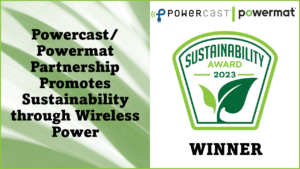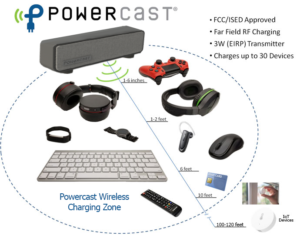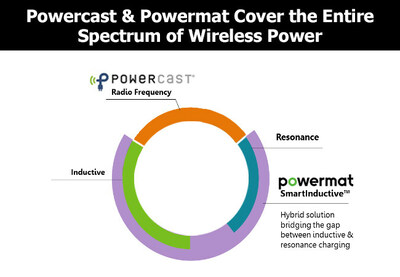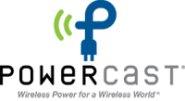Powercast & Nichicon Integrate RF Charging with Small Li-Ion Battery in Demo of Wireless Charging for Small Devices

Powercast, the one-stop-shop for all things wireless power, and Nichicon, a world leader in manufacturing electronic components, are collaborating to add radio frequency (RF) charging capabilities to Nichicon’s new Small Lithium Titanate Oxide (LTO) Rechargeable Batteries (SLBs).
To demonstrate how to design small, sustainable, rechargeable-battery-based devices that can reduce both disposable battery e-waste and expensive battery maintenance, the companies paired Powercast’s over-the-air RF wireless charging technology with Nichicon’s SLB, which together can fit into small devices such styluses, wireless thermometers, medical devices and IoT sensors.
The companies created a stylus demo, which Nichicon will debut at the 2023 Arrow Technology Expo in Chicago on October 26th at the Stonegate Conference & Banquet Center.
In the slim stylus demo, Powercast’s tiny receiving antenna and Powerharvester PCC110 RF-to-DC converter chip embedded in the stylus harvests RF sent over the air from Powercast’s RFID transmitter, converting it to DC to wirelessly recharge Nichicon’s embedded SLB04255L040 battery. The battery then powers the flashlight LED at the end of the stylus, with RF technology recharging the battery when it’s not in use.
“Wirelessly-powered, sustainable devices help solve the environmental problem of disposable batteries that litter landfills and release toxins, and the inconvenience and expense of battery replacement,” said Charles Greene, PhD, COO and CTO of Powercast. “We are teaming with Nichicon, whose long-life rechargeable batteries can store the energy generated by Powercast Technology and repeatedly discharge it over and over as needed.”
“This collaborative effort allows companies to develop environmentally-friendly, small consumer and IoT devices that eliminate disposable batteries,” said Craig Anderson, President of Nichicon America. “Our vision is to make IoT and consumer device ecosystems more sustainable now and into the future.”
About Powercast:
Powercast Corporation is the one-stop-shop for all things wireless power, short to long range and microwatts to kilowatts, with the industry’s broadest technology offering covered by over 300 patents worldwide. Since founding in 2003, Powercast has led the industry in RF wireless power innovations that meet FCC and other global standards, and recently added inductive/resonant solutions to its product portfolio after forging a partnership with Powermat. Powercast’s technologies eliminate or reduce the need for wires and batteries, curtailing waste in our landfills. Our collaborative approach and expertise in all wireless aspects, from concept and design through prototyping and mass production, has resulted in many applications, extensive commercial success in both industrial and consumer applications, and over 20 million units shipped.
About Nichicon:
Nichicon Corporation, established in 1950, is a prominent Japanese company specializing in electrical components. Since then, Nichicon has grown into one of the world’s leading capacitor manufacturers, renowned for its high-quality products and innovative technologies. The company’s extensive product portfolio encompasses various types of capacitors, including aluminum electrolytic capacitors, film capacitors, and electric double-layer capacitors. Recently, Nichicon introduced its first battery project, the new Nichicon SLB battery. One of Nichicon’s main goals is to promote the SLB in IoT ecosystems as a new and innovative alternative to traditional power sources. www.nichiconbattery.com
Wireless Powerhouse Partners Powercast & Powermat Win Sustainability Award
The companies’ combined wireless power technologies reduce emissions and battery and cable e-waste, and optimize water conservation and farming operations

Powercast and Powermat proudly announce that their wireless power partnership was awarded Sustainability Initiative of the Year in Business Intelligence Group’s 2023 Sustainability Awards program, for the companies’ joint efforts to promote sustainability through wireless power.
The two pioneers of wireless power — Powercast with long-range, over-the-air RF technology, and Powermat who brought short-range Inductive charging to smartphones, cars and coffee shops — recently partnered creating one team that can implement sustainable and environmentally-friendly designs across the entire spectrum of wireless power, short to long range and microwatts up to 600 watts.
The companies’ combined wireless power technologies improve sustainability in multiple ways. They:
- Reduce the e-waste that litters landfills with wirelessly-powered, untethered devices that eliminate cords, cables, and single-use disposable batteries because they use rechargeable batteries
 or none at all.
or none at all. - Reduce emissions with wireless charging of otherwise gas-powered EVs.
- Optimize efficiency of water treatment and conservation operations with underwater charging of water pumps, filters, and vacuums, eliminating wires under water.
- Optimize efficiency of smart farming with wirelessly-powered drones, robotics and EVs that cut the cords, reduce emissions and conserve energy.
“This partnership saves customers from having to research which power solution is the best fit. Now, no matter the application, this cohesive entity can make sure the best solution is applied. In addition, this alliance provides full engineering and design support across the entire spectrum, from concept to prototyping, all the way to production and delivery of end product if needed. We are a wirelesspower one-stop-shop, regardless of application,” said Charles Goetz, CEO of Powercast. “This is a first-of-its kind convenience for our customers.”
“As partners, we believe wireless charging of otherwise gas-powered EVs is a key to reducing emissions and conserving energy,” said Kfir Abuhatzira, Powermat’s CEO. “Wireless charging can also make a huge environmental impact by reducing e-waste, saving hundreds of millions of batteries and cables from ending up in our landfills.”
Optimized for different applications, the companies’ technologies differ in strength/transfer distance, and together cover the entire spectrum of wireless power: Powercast’s RF transmitters and receivers can transfer power over distances up to 120 feet, but deliver low power levels. This technology is designed for one-to-many charging of low-power consumer and industrial devices in hard-to-reach locations where wiring/battery replacement is prohibitive, like IoT sensor networks. Additional devices include home-automation sensor networks, TV remotes, electric toothbrushes, headphones and more.
- On the other hand, Powermat’s SmartInductive transmitters and receivers must closely align–within 8 inches–but can transfer more power (5 to 600 watts) for industrial-grade applications
 like telecom, robotics, micro-mobility, medical devices, and underwater charging.
like telecom, robotics, micro-mobility, medical devices, and underwater charging.
Powercast and Powermat share a vision of a 100% wireless future, where people and machines enjoy 100% freedom from traditional wall-tethered power transfer methods.
The ultimate goal is to create true wireless freedom through an ecosystem of connected transmitters and receivers, both in the public and private domain, which provide people, products and machines the ability to move around freely with seamless access to power.
Powercast and Powermat partner to create first one-stop-shop wireless powerhouse to deliver power ranging from SmartInductive to RF up to 120ft
Leverages Powermat’s high-power, short-range SmartInductive technology and Powercast’s low-power, long-range RF technology and engineering/productization expertise to create one destination for all things wireless power
PITTSBURGH and TEL AVIV, Israel, June 13, 2023 /PRNewswire/ — Two of the world’s pioneers of wireless power technology, Powercast with its long-range over-the-air RF (radio-frequency) technology, and Powermat with its SmartInductive™ hybrid inductive/resonance technology, are partnering to create one team that can implement both short and long-range wireless power designs optimized for each customer’s application. Additionally, the partnership will leverage Powercast’s engineering and productization services to support customers as needed from proof of concept to prototyping to production.
Both companies’ wireless power technologies enable more convenient, sustainable, environmentally-friendly, untethered devices that cut the cords, and use rechargeable batteries or no batteries at all to eliminate battery e-waste and battery replacement hassles. The two companies share a vision of a world where power is ubiquitous, wire-free, and seamlessly accessible. Powercast (booth #840) and Powermat (booth #805) will discuss their partnership and the world of wireless power at Sensors Converge in Santa Clara, CA, June 20 – 22, 2023.
“The convenience of a one-stop-wireless-power-shop has not existed before,” said Charles Goetz, CEO of Powercast. “First, since our partnership covers the entire spectrum of wireless power, customers can ditch researching solutions themselves and relax knowing we’ll recommend the best fit for them. Second, whether you’re a start-up or Fortune 500, our productization team can help reduce costs and speed time to market.”
“Our IP licensing business model has been successful as our technology is embedded in 800 million smartphones and charging surfaces in 8 million cars, and in 40 million devices like robots, e-bikes, and IoT and medical devices,” said Kfir Abuhatzira, Powermat’s CEO. “But we are excited to be able to expand our services by partnering with Powercast whose dedicated design, engineering and manufacturing division can help customers wanting productization support.”
The Powermat and Powercast partnership covers entire spectrum of wireless power:
Both companies’ transmitters (Tx) send energy to receivers (Rx) that convert it into power, but they differ in strength and transfer distance so fit different applications. Powermat’s SmartInductive Tx and Rx must closely align (within 8 inches), but can transfer large amounts of power (5 to 600 Watts). Powercast’s RF Tx and Rx can transfer power over distance (up to 120 feet), but deliver lower power levels ranging from 100s of milliwatts to single digit microwatts depending on distance.
Powermat’s high-power SmartInductive hybrid inductive/resonance technology enables scalable wireless power applications capable of penetrating eight inches of wall and windows, and is offered in reference design platforms ranging from 5-Watt consumer grade applications to 600-Watt industrial grade applications like telecom, robotics, micro-mobility, medical devices, and more.
Powercast’s RF technology is designed for low-power consumer and industrial devices that need freedom of placement, and often operate in hard-to-reach places such as IoT sensor networks where wiring and battery replacement would be difficult. RF also enables one-to-many charging, meaning one Tx can charge many enabled devices in its charging zone. Additional device examples include home automation sensor networks, TV remotes, electric toothbrushes, headphones and smart watches.



